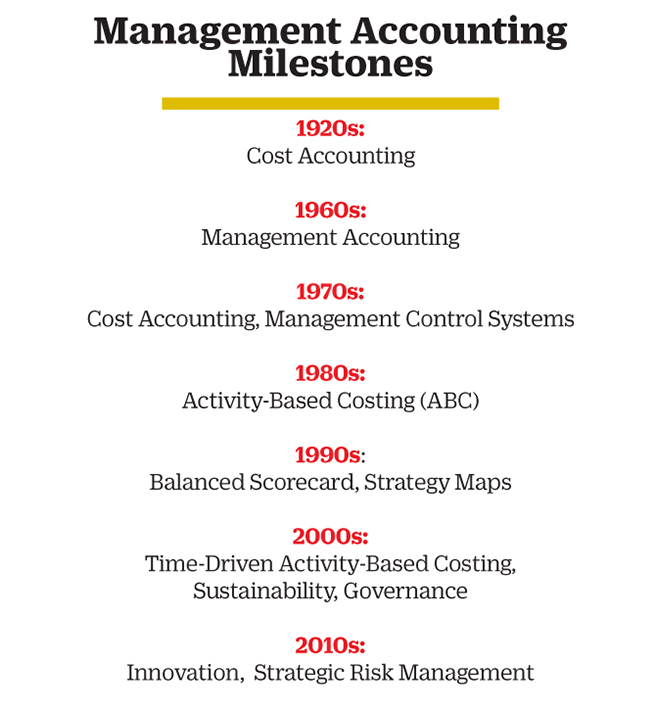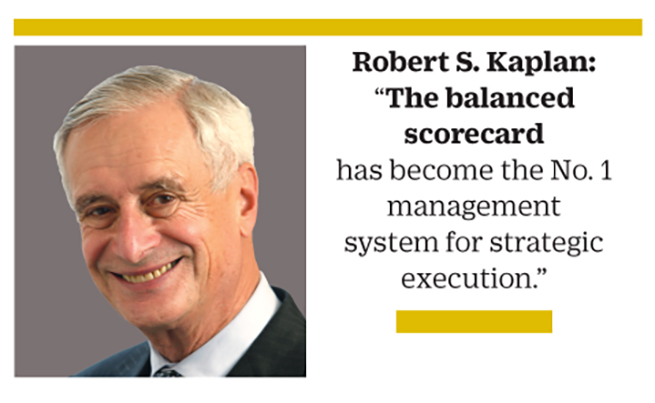A few of the leaders in the major developments of the profession are Major J. Lee Nicholson, Robert N. Anthony, Ross G. Walker, Charles T. Horngren, Robert S. Kaplan, Eliyahu M. Goldratt, James O. McKinsey, Marc J. Epstein, and Kenneth A. Merchant. They and others have taken the management accounting profession to where it is today.
THE EARLY YEARS: 1919-1969
In October 1919, when Major J. Lee Nicholson founded the National Association of Cost Accountants (NACA), now IMA, cost accounting was starting to gain prominence. Known as the “father of cost accounting,” Nicholson led this effort to determine and account for product and other costs (see “IMA Pioneers: Four Who Made a Difference”) The focus on cost accounting lasted until the early 1950s when it shifted to management accounting, which emphasized providing accounting information to use for management planning and control. Since then, management accounting has expanded to include strategy, strategy execution, and much more.
Management accountants also led the way in the invention of management consulting. In 1926, James O. McKinsey, a University of Chicago professor and expert on management accounting, established his consulting firm, McKinsey & Company. He set an enduring tone of independence and established a commitment to rigorous research and training. He also is credited with writing the first textbook on business budgeting, Budgetary Control, published in 1922, and the first textbook on management accounting, Managerial Accounting, Vol. 1, published in 1924.
Marvin Bower, managing director of the firm from 1950 to 1967, also was a major force in shaping the firm and its core values and was considered the father of modern management consulting. He stressed integrity and established standards for the firm so its work would always be respected. For more, visit https://mck.co/2VSQHb7.
Universities played a part in the evolution, too. Some of those events are outlined in “The Contribution of the Harvard Business School to Management Control, 1908–1980” by Stephen A. Zeff in the Journal of Management Accounting Research, Special Issue 2008.
This article documents and discusses the evolution of management control, which includes management and financial accounting, in the Harvard Business School from 1908 to 1980. It emphasizes the roles of the key movers, Ross G. Walker and Robert N. Anthony. Simultaneous developments at Massachusetts Institute of Technology and the University of Chicago also are covered in the article.
THE NEXT 50 YEARS: 1969-2019
In the second 50 years, innovations in management accounting have been prolific and have continued to enhance how management accountants think and work. ABC, performance measurement, the balanced scorecard, Lean accounting, management control systems, and strategy maps are just a few. (See the timeline below for some of the major milestones, the following sections about Kenneth Merchant, Marc Epstein, and Robert Kaplan for an in-depth analysis, and "Further Reading" at the end of the article.)
THE NEXT PHASE
What’s ahead for management accountants? It’s about becoming expert in and using the latest digital technology such as blockchain, AI, augmented reality, data analytics, and more to make decisions that improve businesses and society. Management accounting also will continue to develop as a strategic discipline focused on helping companies create long-term sustainable value. That’s only the beginning.

Kenneth A. Merchant

Kenneth A. Merchant, Deloitte & Touche LLP Chair in Accountancy at the University of Southern California, discusses the top innovations in management accounting during the last 50 years and the current state of management accounting in academia in the United States, Europe, and Asia.
SF: Based on your experience, what would you consider the top three innovations in management accounting during the last 50 years?
Merchant: They are activity-based costing, balanced scorecards, and management control systems frameworks. ABC refreshed our thinking about the purposes of product costing and cost accounting (to make better decisions) and showed us better methods of assigning indirect costs to cost objects (far better than “peanut butter spreading-like” allocations). The balanced scorecard framework described how to develop an integrated information system while maintaining a clear focus on both organizational goals and strategies. Importantly, the integration included both financial and nonfinancial measures and goals and responsibilities up and down the management hierarchy.
Many management control systems frameworks have been developed and described in the last 50 years. Some focus on the elements of these complex systems, which can involve, for example, performance measures and incentives, required policies and procedures, direct supervision, internal audits, and/or a strong corporate culture, and show how those elements can be substitutes or complements. Some show how certain design features are related to specific outcomes, both positive and negative. Some show how the outcomes depend more on the styles in which the systems are used than the specifics of the system design. Perhaps most importantly, these frameworks put accounting-type controls in perspective: They demonstrate clearly that the use of performance-dependent incentive systems often isn’t the preferred control option.
SF: As a long-term academic in management accounting, how would you describe the current state of management accounting in academia in the U.S., in Europe, and in Asia?
Merchant: Management accounting is as relevant in practice as it has ever been. The methods and tools of management accounting are in common use and have become even more important in the fast-moving world we live in. In U.S. academia, though, there are some worrisome trends. As business schools place more curricular emphasis on “newer” subjects like ethics, business communications, entrepreneurship, and corporate social responsibility, the teaching of management accounting is being cut back. In many schools, it has been removed from MBA curricula entirely.
To allow the introduction of the new courses, each academic department has to bear its “fair share” of the cuts. Since financial accountants dominate most accounting departments, they win every departmental vote (and most department decisions do come down to a vote). The management accounting courses are sacrificed, even in executive MBA programs where it can be easily argued that management accounting is far more relevant to most of the students’ careers than is financial accounting.
This cutback has a ripple effect. With fewer courses to teach, fewer management accounting professors are needed, and, as a consequence, management accounting Ph.D. programs are being reduced in size. These cutbacks will result in less management accounting research output, and academic development of the field will suffer. It is a significant downward trend in the U.S.
The potential saving grace, however, is that management accounting academia in Europe and Asia is stronger than it has ever been, and its size and importance continue to grow. The field of management accounting will continue to develop. But an easy prediction is that leadership in the field will increasingly come from academics in Europe and Asia and, of course, forward-looking practitioners.
Marc J. Epstein

Marc J. Epstein was, until 2014, Distinguished Research Professor of Management at Jones Graduate School of Management at Rice University in Houston, Texas. Prior to joining Rice, he was a professor at Stanford Business School, Harvard Business School, and INSEAD (European Institute of Business Administration). In both academic research and managerial practice, he is considered one of the global leaders in the areas of innovation, sustainability, social impact, and accountability in corporations and not-for-profit organizations. He is the author of more than 20 books and 200 articles.
SF: Please describe what you believe are the major themes of your work in management accounting.
Epstein: Management accounting is critical to provide information for management decision making. As society and for-profit and nonprofit organizational needs change, management accounting must change also. Much of my work has focused on the application of performance measurement and management control to improve organizations and society.
From my extensive work on corporate social responsibility in the U.S. beginning in the 1970s with IMA and continuing with work in business approaches to improving health and education in sub-Saharan Africa, Asia, and South America, a common theme was how performance measurement and management control systems could improve both organizations and society, including improving the environment, alleviating global poverty, and improving the lives of customers, employees, suppliers, and other stakeholders. My research, writing, and speaking over the past decades focused on using management accounting concepts and tools to improve the performance and the social impact of organizations.
I have written two books on innovation, applying management accounting and control concepts to improve the ability of organizations to achieve more of both incremental and breakthrough innovation.
Another major theme of my work has been the importance of organizational and individual accountability, including personal and organizational ethics and culture. This accountability includes both transparency and governance. It involves further clarifying the roles and responsibilities of boards of directors in for-profit and nonprofit organizations and then developing tools for measuring the performance of both boards and board members for accountability and to improve board and organizational performance.
SF: What is the current focus of your latest work?
Epstein: I remain active in sustainability and social impact, innovation, and governance. I have just completed a book titled The Brilliant Jerk Conundrum: Thriving with and Governing a Dominant Visionary. This book is at the nexus of my work on innovation and governance. It focuses on how boards can know the difference between inspired visionaries like Steve Jobs, a firebrand entrepreneur like Elon Musk, and a potentially hazardous leader like Elizabeth Holmes and if, when, and how to intervene.
I am also working on a book on business ethics that examines why after decades of CEO pronouncements of the importance of business ethics, chief ethics and compliance officers in corporations, and mandatory corporate ethics training programs, corporate ethical violations and frauds continue unabated. Is it because of bad apples, or is it the organization that doesn’t have adequate management control and governance or has misaligned incentives—or some combination of these? The book provides some answers to these questions and innovative solutions for organizations.
SF: What are some of the major forces of change in the way companies are doing business that you think will impact management accounting?
Epstein: Throughout the world, there is a growing recognition that management accounting has an increasingly broader and more critical role and responsibility for the success of enterprises. The trend includes the increased importance of financial executives not only related to managing the finance and accounting functions but taking a seat at the table in all management decisions. Thus, management accounting now includes the use of new digital technologies such as blockchain, AI, and augmented reality to improve organizational operations and decisions.
It also now includes the integration and measurements related to improving performance related to areas such as innovation, sustainability, and corporate governance. As the collection, processing, and management of information becomes more routine, management accountants will be able to devote more time and skills to the critical decisions related to the organizational structures, systems, and decisions that improve businesses, not-for-profit organizations, governments, and society. These important contributions to society become core to what management accountants do on a daily basis.
Robert S. Kaplan

Robert S. Kaplan is Senior Fellow and Marvin Bower Professor of Leadership Development, Emeritus at the Harvard Business School. A true force and innovator in management accounting, he has authored or coauthored more than 175 journal articles and 14 books, and he has collaborated with H. Thomas Johnson, David P. Norton, Robin Cooper, Michael Porter, and others on some of the most significant advances in management accounting.
In 1987, he and Johnson wrote the book Relevance Lost: The Rise and Fall of Management Accounting, which is an overview of the evolution of management accounting in U.S. businesses from the 1880s textile mills to businesses in the 1980s and how changes needed to be made to management accounting systems so managers could do better long-term planning.
Based on the call for changes in Relevance Lost, Kaplan and Cooper developed the concepts and principles of activity-based costing (ABC), wrote teaching cases about ABC initiatives, used them in their MBA classes, and later helped companies implement ABC. In describing the origins of ABC, Kaplan says, “After we had taught the new cases several times to diverse audiences and given speeches about the phenomena at public conferences, we began to work directly with companies, helping them to implement the new costing approach. We also exposed the ideas to wider audiences by publishing papers in practitioner journals, including Management Accounting, Journal of Cost Management, and Harvard Business Review.
“Our explicit goal in writing these articles was to generate some excitement, enthusiasm, and debate about the new ideas among a broad management audience. At this point, each concept had evolved far enough that it could be named and illustrated with experiences from the initial innovating companies. The experiences from teaching and speaking about the emerging concept enabled us to communicate the essential ideas in ways that were accessible and understandable by a group of practitioners who had no direct experience with the concept, as captured in the initial set of teaching cases.
This communication step was vital. It positioned us as advocates for a new management approach. We could then receive comments and feedback from managers and academics around the world. Even more important, if done well, managers from an entirely new set of organizations will invite the scholars to implement the concept in their organizations. Such new implementations are the most innovative, critical, and controversial aspect of an innovation action research cycle. Without this step, however, the cycle of innovation will be broken and the advancement of new knowledge will cease, or at least, be considerably delayed.”
Kaplan’s next work was developing the balanced scorecard with Norton. They introduced the balanced scorecard in a January-February 1992 Harvard Business Review article titled “The Balanced Scorecard: Measures that Drive Performance” and a 1996 book, The Balanced Scorecard: Translating Strategy into Action. The balanced scorecard was originally introduced to improve corporate performance measurement by balancing lagging metrics of financial performance with nonfinancial metrics that drive future performance.
Their fifth book together, The Execution Premium: Linking Strategy to Operations for Competitive Advantage (2008), captured the accumulated lessons from the previous 15 years by describing how the balanced scorecard has become the No. 1 management system for strategy execution. They also wrote The Strategy-Focused Organization: How Balanced Scorecard Companies Thrive in the New Business Environment, Strategy Maps: Converting Intangible Assets into Tangible Outcomes, and Alignment: Using the Balanced Scorecard to Create Corporate Synergies.
Kaplan currently works with Porter on introducing time-driven activity-based costing (TDABC) in the healthcare field to deliver superior patient outcomes at significantly lower costs. They described this work in a 2011 Harvard Business Review article, “How to Solve the Cost Crisis in Health Care,” and in the January 2017 Strategic Finance article, “Managing Healthcare Costs and Value.”
Further Reading
- Cost Accounting—A Managerial Emphasis by Charles Horngren, Srikant M. Datar, and Madhav V. Rajan
- Management Control Systems by Robert Anthony and Vijay Govindarajan
- “Robert N. Anthony: A Pioneering Thinker in Management Accounting” by Jacob G. Birnberg, Accounting Horizons, September 2011
- Relevance Lost: The Rise and Fall of Management Accounting by H. Thomas Johnson and Robert S. Kaplan
- Measuring Corporate Environmental Performance: Best Practices for Costing and Managing an Effective Environmental Strategy by Marc J. Epstein
- Strategy Maps: Converting Intangible Assets into Tangible Outcomes by Robert S. Kaplan and David P. Norton
- The Goal: A Process of Ongoing Improvement by Eliyahu M. Goldratt and Jeff Cox and Theory of Constraints by Eliyahu M. Goldratt
- “The Balanced Scorecard: 20 Years and Counting” by Mark L. Frigo with Robert S. Kaplan and David P. Norton, Strategic Finance, October 2012
- “Time-Driven Activity-Based Costing” by Robert S. Kaplan and Steven R. Anderson, Harvard Business Review, 2004, and “Managing Healthcare Costs and Value” by Robert S. Kaplan, Michael E. Porter, and Mark L. Frigo, Strategic Finance, January 2017

June 2019



